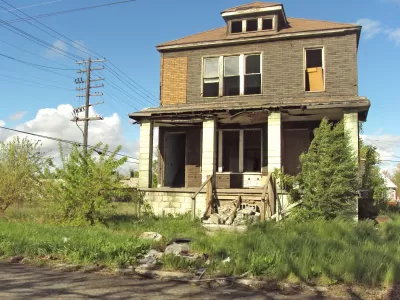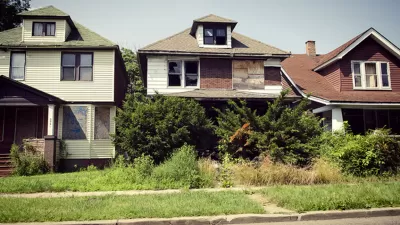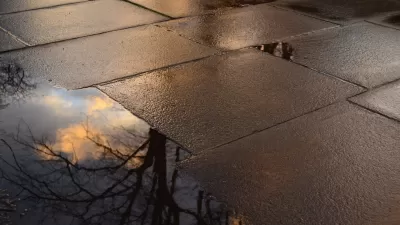While the Detroit Land Bank has had its ups and downs, it has made significant progress in a city with no shortage of vacant and delinquent properties.

John Gallagher takes a closer look at the Detroit Land Bank Authority, both its accomplishments and difficulties in recent years. The Land Bank was established in 2008, but it was not until 2014 that it gained traction and acquired the city’s 50,000 vacant parcels, says Gallagher:
Since then, property tax foreclosure and other trends have boosted the Detroit Land Bank's inventory to about 95,000 parcels today — more than one-fourth of all the individual parcels in the city. It is the largest such inventory of publicly held land of any city in the nation.
The Land Bank makes vacant lots, houses, and other buildings available through sales, auctions, and a buyback program for homes facing property tax foreclosure. “Beginning in 2014, when Detroit Land Bank organized on its current model, it has auctioned 1,866 houses, sold 1,906 properties through the Own It Now program and closed on about 500 BuyBack sales, in addition to then 10,000 side-lot sales,” reports Gallagher.
The Land Bank, however, has been criticized for not selling properties fast enough. The organization had also grappled with leadership turnover in its first years, until its current executive director took the helm a year ago. In addition, the demolition program to remove blighted structures, affiliated with the Land Bank, is facing allegations of corruption, says Gallagher.
Still, Gallagher believes the Land Bank has achieved a great deal in a relatively short amount of time. “In the broadest sense, the Land Bank’s achievements give hope that urban problems really can be solved. If a challenge as intractable as Detroit’s vacant and abandoned land can yield to innovation and commitment, perhaps all the city’s ills will so yield,” he says.
FULL STORY: Detroit Land Bank notches many wins including 10,000 side-lot sales

Alabama: Trump Terminates Settlements for Black Communities Harmed By Raw Sewage
Trump deemed the landmark civil rights agreement “illegal DEI and environmental justice policy.”

Study: Maui’s Plan to Convert Vacation Rentals to Long-Term Housing Could Cause Nearly $1 Billion Economic Loss
The plan would reduce visitor accommodation by 25% resulting in 1,900 jobs lost.

Planetizen Federal Action Tracker
A weekly monitor of how Trump’s orders and actions are impacting planners and planning in America.

Federal Homelessness Agency Places Entire Staff on Leave
The U.S. Interagency Council on Homelessness is the only federal agency dedicated to preventing and ending homelessness.

Restoring Northern India’s Himalayan ‘Water Temples’
Thousands of centuries-old buildings protect the region’s natural springs and serve as community wells and gathering places.

Milwaukee to Double Bike Share Stations
Bublr Bikes, one of the nation’s most successful, will add 500 new e-bikes to its system.
Urban Design for Planners 1: Software Tools
This six-course series explores essential urban design concepts using open source software and equips planners with the tools they need to participate fully in the urban design process.
Planning for Universal Design
Learn the tools for implementing Universal Design in planning regulations.
Caltrans
Smith Gee Studio
Institute for Housing and Urban Development Studies (IHS)
City of Grandview
Harvard GSD Executive Education
Toledo-Lucas County Plan Commissions
Salt Lake City
NYU Wagner Graduate School of Public Service





























